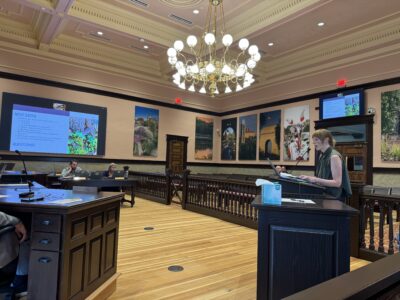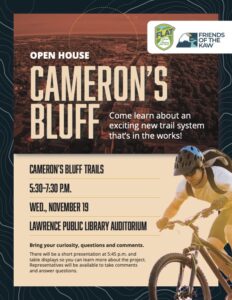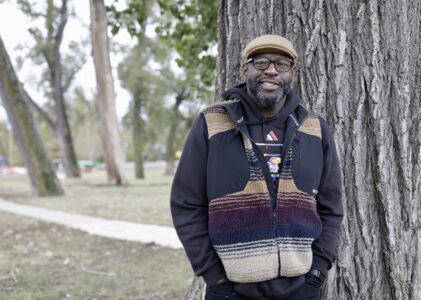Douglas County commissioners raise questions about land permanently protected for urban farming as a conservation project

photo by: Josie Heimsoth/Journal-World
Kaitlin Stanley, executive director of the Kansas Land Trust, speaks at the County Commission meeting on Wednesday, Sept. 10, 2025.
An urban farm in Douglas County could be permanently preserved to support beginning farmers, and county commissioners on Wednesday discussed how it could impact future development.
The commissioners received an update on a partnership between Douglas County and the Kansas Land Trust, which has identified three key voluntary land conservation projects to implement as part of the county’s Open Space Plan.
Two of these projects are conservation easement projects, which are when landowners voluntarily place restrictions on how their property will be used or developed in the future. The easements can create restrictions that last even after the property has been sold to a new owner.
Meanwhile, another project is expected to advance several community and environmental objectives and aligns with Douglas County’s Climate Action Plan, Food Systems Plan, Open Space Plan and the Kansas Land Trust’s Strategic Conservation Plan. According to the memo, the KLT received an application from an urban farmer seeking to permanently preserve their land for agricultural use, specifically to support new and beginning farmers. The location of the land was not disclosed on Wednesday.
This urban farming project differs from the other two projects, which prioritize creating conservation corridors that can be used for recreation. This specific project is also in its early stages, Kaitlin Stanley, executive director of the KLT, said, and a conservation easement may not be the best tool to make this project happen in Douglas County.
“The conservation easement may not be the appropriate pathway,” Stanley said. She added there may be another protective measure that could ensure that the land remains an urban farm that supports new farmers.
Commissioner Patrick Kelly said this project has his “wheels turning.” Since the farm would be in an urban setting, he wondered if this would limit any type of development in that area in the future if a conservation easement were placed on the land.
“We have to think about how land is used all over the county and what might be the next spot that development could go,” Kelly said. “But if we are putting money towards that type of (project), are we sort of putting a permanent hold on something in the future?”
Commissioner Karen Willey said she thinks the intention of this project, along with the others, is that as development occurs in the county, these areas become even more important.
“These become more critical to have some lands that are set aside for the other kind of public benefits beyond housing and infrastructure and that sort of thing,” Willey said.
Stanley said a lot of the acres that are protected by the KLT are farmland, and for other people interested in doing so, there are ways for people who own farmland to protect it and keep it that way for future use.
As the Journal-World reported, there are two other projects the KLT will be working on as a part of this initiative. The first project is a collaborative effort among five neighboring landowners who jointly manage 400 acres of oak-hickory forest and 1.34 miles of streambank in southwest Douglas County. Their goal is to establish a conservation corridor that also offers recreational opportunities. Plans include developing public trails and designated areas for low-impact tent camping on a portion of the land.
Project two focuses on a private landowner with a remnant prairie near Clinton Lake. The land will be transferred to a conservation-focused organization upon the owner’s death, with the intent to use it for public education and low-impact recreation. Located near other protected areas such as Clinton Lake, the site will serve as an important wildlife corridor and could facilitate future recreational trail connections, particularly as residential development grows west of K-10.
Sixteen landowners had expressed their interest in voluntary land conservation, and the Kansas Land Trust received eight applications from eligible landowners. Of those applications, these three projects were selected.
The pilot program is supported by $250,000 from the $2.78 million in American Rescue Plan Act funds allocated by the County Commission in 2022 for open space planning and related initiatives. These initiatives include improving existing parks, aiding private land conservation efforts, and preserving the Wakarusa River Corridor. According to a memo in the agenda, the use of ARPA funds complies with federal guidelines, and they must be fully spent by December 2026.
In other business, county commissioners:
• Approved the appointment of Adam Y. Zentner as special counsel in any and all criminal investigations and prosecutions involving Justin Robert Royer due to conflicts of interest. This was requested by Douglas County District Attorney Dakota Loomis, who previously served as Royer’s defense attorney. Loomis and staff estimated that the cost would not exceed $25,000, the funds were available in the District Attorney’s Office budget, and Zentner had agreed to take the case along with the negotiated rate, a memo in the agenda said.
In May, a similar request was made for Zentner to be appointed to special counsel for the State vs. Justin Royer case, but this appointment is related to a new case. Loomis said the May appointment was specific to a case that had already been filed — a case alleging child sex crimes.
“If there is any other case or report that requires a special prosecutor, that must be taken up in a separate contract before the special prosecutor can either enter their appearance in the filed matter or make a charging decision in an unfiled matter,” Loomis said.







